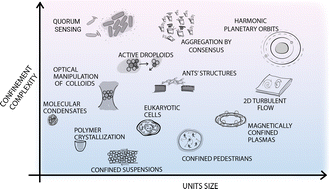*
Corresponding authors
a
Departamento de Física, Faculdade de Ciências, Universidade de Lisboa, Lisboa, Portugal
E-mail:
nmaraujo@fc.ul.pt
b
Centro de Física Teórica e Computacional, Faculdade de Ciências, Universidade de Lisboa, Lisboa, Portugal
c
Department of Applied Physics and Science Education, Eindhoven University of Technology, P.O. Box 513, Eindhoven, The Netherlands
E-mail:
l.m.c.janssen@tue.nl
d
Institute for Complex Molecular Systems, Eindhoven University of Technology, P.O. Box 513, Eindhoven, The Netherlands
e
University of Bordeaux, CNRS, LOMA, UMR 5798, Talence, France
f
Department of Physics and INFN, University of Torino, via Pietro Giuria 1, Torino, Italy
g
Kavli Institute at Cornell for Nanoscale Science, Cornell University, Ithaca, New York, USA
h
Laboratory of Atomic and Solid-State Physics, Cornell University, Ithaca, New York, USA
i
Gulliver UMR CNRS 7083, ESPCI Paris, Université PSL, Paris, France
j
Soft condensed matter, Department of Physics, Debye institute for Nanomaterials Science, Utrecht University, Princetonplein 1, Utrecht, The Netherlands
k
Department of Physics and Astronomy, University of Sheffield, Hounsfield Road, Sheffield, UK
l
Research Centre on Animal Cognition (CRCA), Centre for Integrative Biology (CBI), Toulouse University, CNRS, UPS, Toulouse, AD, France
m
Department of Biological Sciences, New Jersey Institute of Technology, Newark, NJ, USA
n
Department of Applied Physics and J. M. Burgers Center for Fluid Dynamics, Eindhoven University of Technology, P.O. Box 513, Eindhoven, The Netherlands
o
Max Planck Institute for Dynamics and Self-Organization (MPI-DS), Göttingen, Germany
p
Rudolf Peierls Centre for Theoretical Physics, University of Oxford, Oxford, UK
q
Laboratory for Soft Materials and Interfaces, Department of Materials, ETH Zürich, Zürich, Switzerland
r
Department of Bionanoscience, Kavli Institute of Nanoscience, Delft University of Technology, Delft, The Netherlands
s
Institut für Theoretische Physik II: Weiche Materie, Heinrich-Heine-Universität Düsseldorf, Universitätsstrasse 1, Düsseldorf, Germany
t
Institute of Physics & Astronomy, University of Potsdam, Karl-Liebknecht-Str 24/25, Potsdam-Golm, Germany
u
Mediterranean Institute for Advanced Studies, IMEDEA UIB-CSIC, C/Miquel Marqués 21, Esporles, Spain
v
Department of Physics, University of Warwick, Gibbet Hill road, Coventry, UK
w
Institute of Science and Technology Austria, Klosterneuburg, Austria
x
Physics of Living Matter, Department of Physics and Materials Science, University of Luxembourg, 162 A, Avenue de la Faïencerie, Luxembourg
y
Laboratoire de Physique de lÉcole normale supérieure, ENS, Université PSL, CNRS, Sorbonne Université, Université Paris Cité, Paris, France
z
Institute of Cognitive Sciences and Technologies, CNR, Via San Martino della Battaglia 44, Rome, Italy
aa
Institute of Particle Technology, Friedrich-Alexander Universität Erlangen-Nürnberg, Cauerstrasse 4, Erlangen, Germany
ab
Departamento de Física y Matemática Aplicada, Facultad de Ciencias, Universidad de Navarra, Pamplona, Spain
ac
Physics of Fluids Group, Mesa+ Institute, Max Planck Center for Complex Fluid Dynamics and J. M. Burgers Center for Fluid Dynamics, University of Twente, Enschede, The Netherlands
E-mail:
a.marin@utwente.nl
ad
Department of Chemistry, University College London, 20 Gordon Street, London, UK
E-mail:
g.volpe@ucl.ac.uk



 Please wait while we load your content...
Please wait while we load your content...